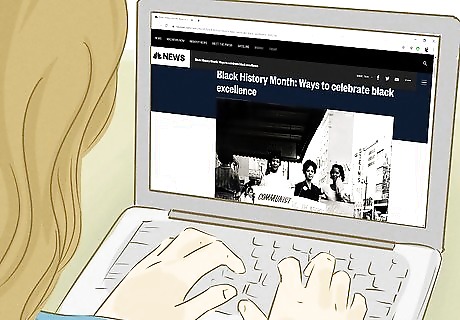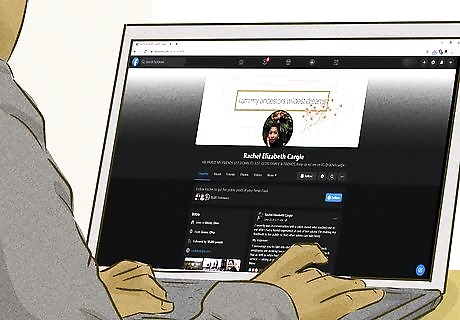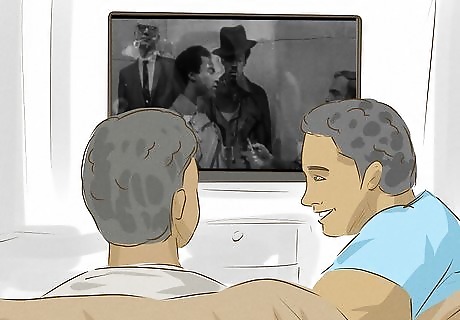
views
The next Black History Month starts on Sunday, February 01, 2026.
Support Black-owned businesses.

Give back to the Black community as a way to celebrate. See if there are any Black-owned businesses near you, or check if your favorite retailers highlight Black businesses. A quick Google search of “Black-owned business selling __” can help you find a product you're looking for. Supporting Black-owned businesses also helps to: Close the racial wealth gap Strengthen local economies Foster job creation for African Americans
Donate to charities who aid Black causes.

Show your support by giving to equity and equality advocacy groups. A simple $5 donation can go a long way. Find a cause that’s close to your heart and let the charity do the rest. You can also post where you’ve donated on social media to encourage friends and family to do the same. Not sure where to donate? Here are a few charities and causes to look into: History and Culture: Alvin Ailey Dance Foundation, National Civil Rights Museum, and Facing History and Ourselves Health: Black AIDS Institute and National Health Law Program Civil Rights: Equal Justice Initiative, NAACP Legal Defense and Educational Fund, and Center for Constitutional Rights Education: Harlem Academy, Sphinx Organization, and Rainier Scholars
Participate in local Black movements.

Honor Black history by letting your voice be heard. As Dr. Martin Luther King showed us, one voice can make a big difference in the way the world works. Ask around to see if any organizations are gathering somewhere near you. These could be walks, protests, or even community gatherings. Put yourself out there to spread awareness and advocate for a better tomorrow. See if Black Lives Matters (BLM) or The Movement for Black Lives (M4BL) have a hub near you by going to their websites. If no events are happening near you, organize your own. Contact your local library to host a Black History Month book club, or start a walking fundraiser for a Black charity or business.
Read books written by Black authors.

Maya Angelou, James Baldwin, and Octavia Butler are phenomenal writers. Reading books by Black authors is not only fun but educational. Black writers highlight the adversity their community endures through the voices of their characters. Keep a list of Black authors in the back of your mind the next time you go to the bookstore or library Some more Black writers who changed literary history include W.E.B. Du Bois, Alex Haley, Langston Hughes, and Toni Morrison. Add some of these modern Black authors to your bookshelf: Colson Whitehead, Saeed Jones, Kiley Reid, and Angie Thomas.
Put on a podcast featuring Black voices.

Open your mind and heart by hearing Black stories from Black people. There’s no one better to tell the history and fight of the Black community than its members. Amplify and support Black voices regularly by tuning into a podcast that explores African American history and culture. Check out some of these shows that’ll have you thinking and laughing: The Midnight Miracle Jemele Hill Is Unbothered Okay, Now Listen I Am Athlete The Right Time with Bomani Jones
Spread the word about Black history with social media.

A simple share can honor Black history and promote change. Take Black History Month as an opportunity to surround yourself with more Black voices. Follow Black influencers and social media accounts advocating for equality. Like their posts and share them on your page. This is an effortless way to show your support, educate others, and advocate. Your voice is loud no matter how many followers you have! Keep reposting, liking, and following Black voices after Black History Month. Advocacy doesn’t end when March begins, so be an ally all year round. If you can’t make donations, share a donation link on your page. Who knows? You may just start a domino effect, and your simple share can turn into hundreds of dollars.
Learn about all Black figures.

This month, honor Black voices that aren’t often talked about. Take time to research notable Black figures who influenced your favorite hobby, contributed to a movement, or are from your hometown. To start, search “notable Black figures” along with your country, state, or a job title. See if any unknown names pop up in your search. Check out the incredible ways these Black people contributed to history: Hannibal Caesar Carter: The second African American to serve as Mississippi’s Secretary of State. Elizabeth Duncan Koontz: The first African American president of the National Education Association. Charity Earley: The first African American woman officer of the Women’s Auxiliary Corps. Jame Alexander Hood: The first African American male student of the University of Alabama in Tuscaloosa.
Visit online Black history exhibits.

Surround yourself with Black culture in the comfort of home. Nowadays, there are hundreds of virtual museum experiences to take part in. This is a great way to get the whole family involved and excited about Black history and culture. All you have to do is google “Black history online exhibits” or visit the National Archives website. Here are some exhibits to get your started: Make Good the Promises: Reconstruction and Its Legacies showing virtually at the Smithsonian National Museum of African American History and Culture Golden Age of Black Radio virtually in the The Archives of African American Music and Culture A virtual tour of Frederick Douglass’ Home through the Frederick Douglass National Historic Site
Watch a historical documentary.

Set up a movie night to celebrate Black History Month. African American culture and the Black community have shaped history as we know it. This month and every month, take the time to learn something new about the Black community’s history and movements. Check out these Black history documentaries on PBS: The African Americans: Many Rivers to Cross Slavery By Another Name Unforgivable Blackness: The Rise and Fall of Jack Johnson Slavery and the Making of America Citizen King Eyes on the Prize If you don’t have access to PBS, check out TED Talks to hear Black voices and learn something new. All you have to do is search “Black history ted talks.”
Attend virtual Black events and celebrations.

Speeches and webinars are an easy way to celebrate Black voices. Many in-person events have gone virtual because of the ease of reaching thousands of more people. Take advantage of this and attend as many Black History Month events as possible. Simply search “Black history month virtual event” to see what events you can attend. The Association for the Study of African American Life and History (ASALH) holds a month-long virtual festival to celebrate. The theme for 2022 is Black Health and Wellness. The Smithsonian hosts online events and workshops on Black history and culture with special guests during February. Learn about Black food, music, and organizations with these free and paid events.
Start a conversation about race.

Being a voice for change is a great way to celebrate. The most important thing you can do during and after Black History Month is spread awareness about issues the Black community face. Change can start with one person, and you can be that person. Talk to a friend or family member about systemic racism, or ask a teacher questions about the Civil Rights movement. Here are some tips to help you have a meaningful and lasting conversation: Approach the topic with respect. Being open and willing to listen to other perspectives can help form meaningful dialogue and deepen your understanding. Think about why you want to talk about race. Ask yourself, “Why am I engaging in this conversation? What do I hope to learn?” Embrace discomfort. Recognize that you don’t know everything, but don’t let the discomfort of it hold you back from learning. Acknowledge your privilege. Understand that everyone has different experiences, and recognize how and why yours may be different than someone else’s. Reflect on what you’ve learned. After having a conversation, sit with your thoughts. Has the conversation made you rethink some of your actions or beliefs?
Learn something new about Black history.

Do some research to celebrate and understand Black History Month. Check out books on African American culture at your local library, or Google Black movements and important historical moments. Try searching “Black history” with your county or state to learn about the history where you live. Knowledge is power, and knowing how Black people have struggled systemically can help you understand the importance of commemorating Black voices and supporting the community. Learn about past and present issues. Black history doesn’t end with slavery. Branch into all eras to truly understand the marginalization of the Black community. Search “Black history” along with “1700s” or “1500s.” Watch TED Talks and educational videos on Black history and culture. All you have to do is search “Black history month ted talks” and click on a topic that interests you.




















Comments
0 comment